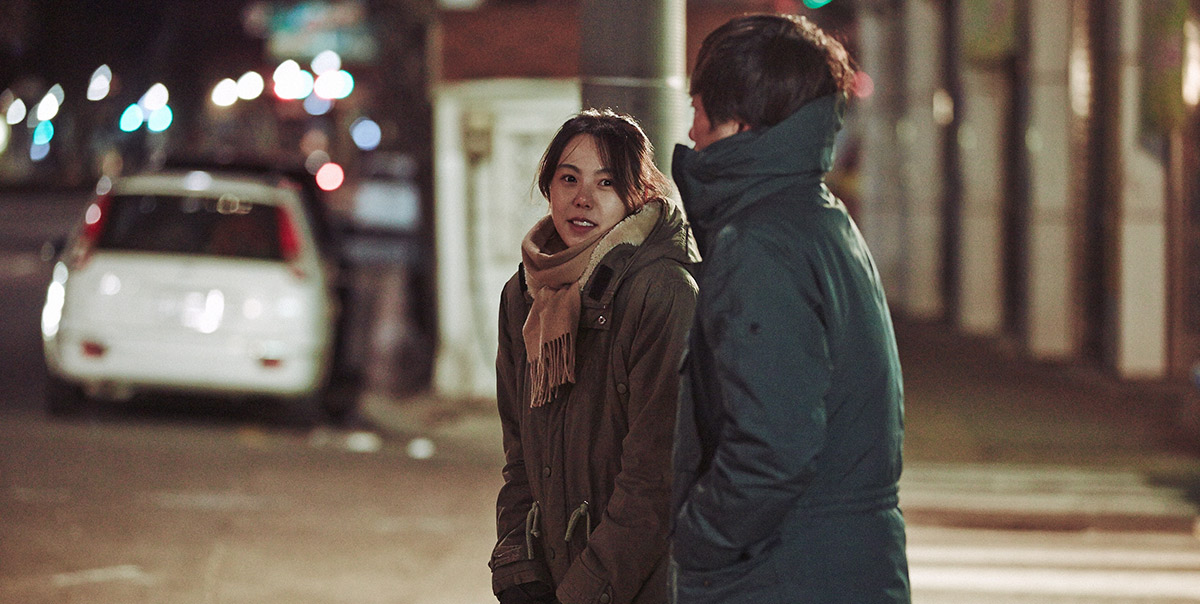Right Now, Wrong Then [2015] is South Korean director Hong Sang-soo’s latest film.
Reimagining Constructs… On paper, this film looks a lot like other films that have come before it: boy meets girl; boy and girl dance around the idea of romance; boy and girl part ways; rewind and replay. It doesn’t sound too interesting or inventive as its description could be dismissively summed up as Before Sunrise [1995] meets Rashoman [1950]. Yet, before there was Showtime’s The Affair and before The Disappearance of Eleanor Rigby [2014], there was Hong Sang-soo. He has been playing around with time and perspective for as long as he has been making films (i.e. since 1996). But unlike The Affair and Eleanor Rigby, Hong’s permutations are less broad: it’s not quite as binary as a his-versus-her perspective gimmick and it’s not quite the Rashoman effect either, which makes Right Now, Wrong Then—and Hong—unique creatures unto themselves.
Reconstructing Constructs… Right Now is replete with Hong’s signatures. His films often feature characters engaged in mundane daily activities such as eating, drinking and talking and Right Now is no different. In this film, the boy is Ham Cheon-soo, a filmmaker who is visiting Suwon, from Seoul, for a screening of his film and a corresponding Q & A whereas the girl is Yoon Hee-jeong, a former model, and current aspiring painter. Cheon-soo and Hee-jeong drink coffee, talk about art, eat sushi and drink soju. Nothing revelatory. Yet, what sets this film apart from the sea of talky indies is its plot structure. The film’s main sequence of events is shown onscreen twice with the title cards reading Right Now, Wrong Then and Right Then, Wrong Now respectively. In juxtaposing two version of the same basic events, Hong uses repetition and variation to invite his audience to scrutinize their preconceptions and examine the nature of memory and remembering. The two versions presented will also subvert audience expectations. In doing this, it’s as if Hong is asking us to 1. engage in an exercise of what-ifs and 2. to examine our notions of romance and romance stories; all of which makes this seemingly simplistic film more complex than what first meets the eye.
Revisiting Constructs… Another interesting aspect of Right Now—which is yet another recurrent aspect of Hong’s films—is that of the foolish male character. Cheon-soo talks often and talks plenty, but he never says much of anything. For instance, in trying to answer a question at his Q & A, he rambles incoherently and spits out a lot of words that ultimately amount to a hill of beans. In fact, when Cheon-soo ends up meeting some of Hee-jeong’s friends, they point out that his meditations on artistry and his critique of Hee-jeong’s paintings are essentially the same points that he usually makes in his interviews. Seemingly suspended in some sort of Marco-Rubio-esque robot mode, Cheon-soo recites the same few reliable lines, time and again, as he self-cannibalizes his own ideas—perpetually in fear that he’ll be found out that he really doesn’t have anything insightful to say at all. In part, it’s curious the degree to which this is metatextual seeing as this kind of criticism could be levied against Hong himself who plays around with the same themes, ideas and basic building blocks of filmmaking time and again. And in this vein, part of this film seems to be about ‘The Movies’ as telling stories and making movies is largely a matter of framing and perspective: To make a film overtly with two variants of the same story without any internal logic like that of Edge of Tomorrow [2014] while featuring a character like Cheon-soo feels like Hong is asking his audience to examine the fork at which our perspective and the cinema intersect and how one informs the other and vice versa. Thus far, it may sound like Right Now is an unbearably earnest and stuffy film, but despite its talkiness and its structure, this film does breath and it’s Hong’s dry humor that undercuts the most serious elements of this film.
A light and humorous structural exercise about the human condition.

